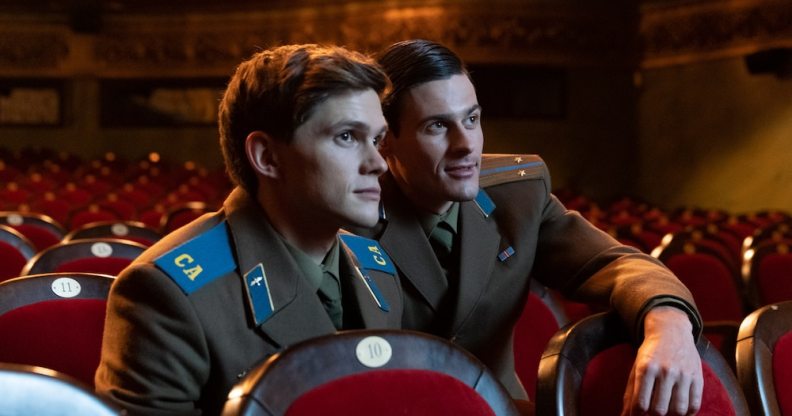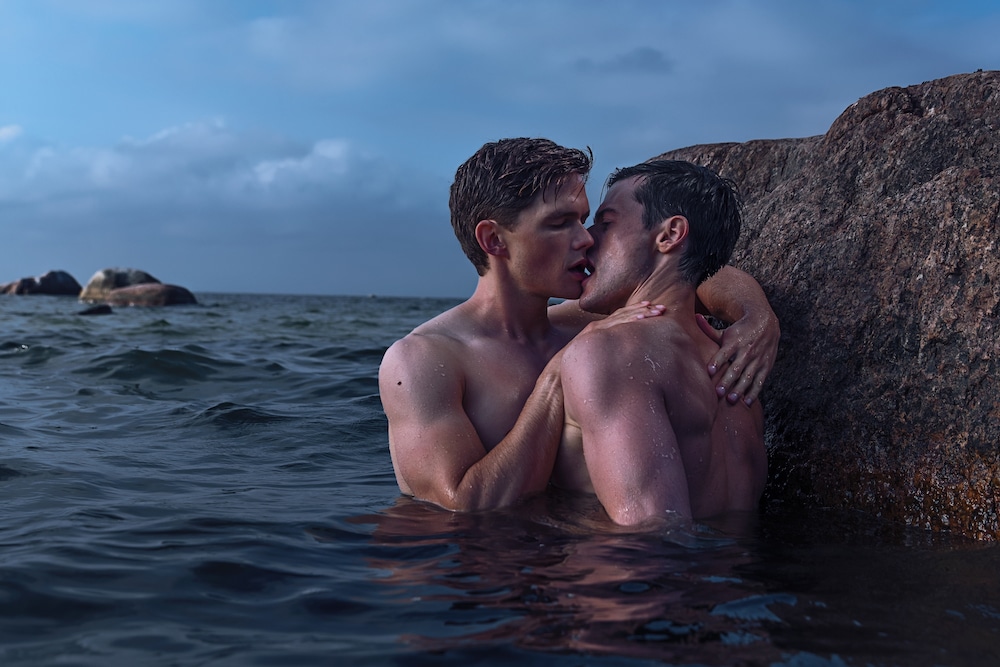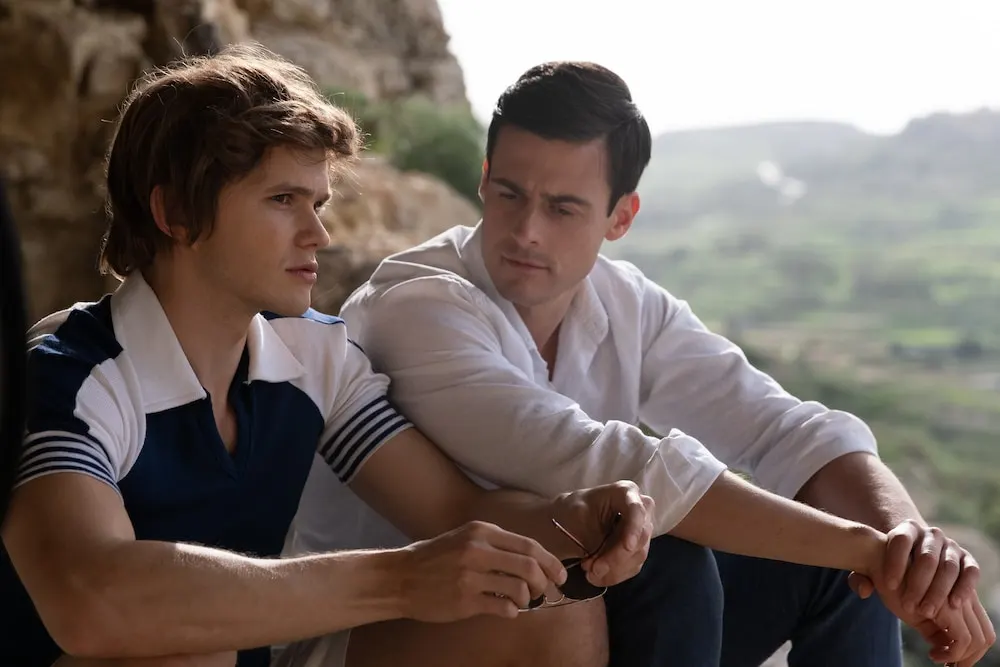Firebird star Tom Prior on the war in Ukraine, forbidden queer love and sex scenes

Tom Prior and Oleg Zagorodnii in Firebird. (Nikolaj Mathies)
On a backdrop of Russia’s invasion of Ukraine, Firebird – a new film that tells a story of forbidden love between queer Russian soldiers in the Cold War – could hardly feel more of the moment.
The film follows Sergey, a troubled young private who is counting the days till his military service ends. His life is turned upside down when Roman, a daring fighter pilot, arrives at the base. Driven by curiosity, Sergey and Roman navigate the precarious line between love and friendship in dangerous surroundings.
In cinemas now – click here for ticket information – Firebird is a familiar tale of a love that the world seems determined to stamp out, with timing and circumstance pulling a relationship apart. It’s a true story, based on The Story of Roman, the memoir of the real-life Sergey Fetisov, which conveys the individual tragedies that underpin historical events. This makes its release at this precise moment even more challenging.
Tom Prior stars in Firebird alongside Oleg Zagorodnii, a Ukrainian actor who was born in Kyiv, the capital city which has resisted Russian occupation. Prior also co-wrote and co-produced the film, which was shot in Estonia.
After graduating from the Royal Academy of Dramatic Art, Prior made his West End debut in a trio of plays produced by the National Youth Theatre, including Tory Boyz, by gay playwright James Graham (Quiz, Ink).
Firebird is Prior’s biggest project to date, having appeared in the Oscar-nominated The Theory of Everything and 2014 spy comedy Kingsman: The Secret Service in smaller roles. As a queer actor, Firebird had been the most in-depth exploration of queer identity of his film career so far, with Sergey navigating intensely sexual and romantic experiences for the first time.
PinkNews caught up with Prior to find out about bringing this important story to our screens, filming nude scenes, LGBT+ rights and what he thinks of “method acting”.
Firebird is a love story about Russian soldiers entangled in a war. What has it been like to create something that feels so close to reality?
It’s definitely been fascinating to see how the film has suddenly become so relevant. My co-lead in the film, Oleg Zagorodnii, is in Ukraine right now and grew up in Kyiv. His home country is under attack and it’s kind of bizarre how often life mirrors art, and art mirrors life, to quote Hamlet.
When I found out that the invasion had begun, I was deeply, deeply upset. Because I want Oleg to be OK. This war has deeply affected me.
We have been also concerned about whether this is going to stop people watching the film, or whether it’s actually going to drive people to watch the film. There are cultural boycotts going on, but although the film is about Russia, it wasn’t made in Russia and it’s an entirely British and Estonian production.
What other parallels do you see between the film and what’s going on today?
The situation that’s going on in Russia really is a microcosm of what we’re dealing with in this film. It’s the bully going after the smaller country, which is similar to how Russia has gone after minorities.
The LGBT+ community in Russia has been a scapegoat for so long, for the dissatisfied citizens of the country, like so many countries have done. Unfortunately, that keeps happening again and again.
It seems like one of the messages of the film is that nothing is certain. Do you think that’s a message LGBT+ people relate to, specifically?
It really is a reminder that, if it continues unchecked, things will continue to go backwards in so many countries. Like what’s happened in Hungary recently, with their “propaganda” law, or in Florida with the ‘Don’t Say Gay’ bill.
We didn’t make the film for political reasons or anything, we made the film because it’s an amazing love story. It’s about two people wanting to be together no matter what, despite going against all the odds. But obviously the level of acceptance around the world in so many countries is still in the dark ages.
And what about the UK?
I honestly don’t think any country that can stand in total confidence with how they’re treating LGBT+ people right now.
Every country in the world still has so much work to do, and I don’t just mean on a governmental basis, I mean on a more personal basis too. You can have the right to get married, legal protection and the rest of it, but you can still be on the street and experience prejudice. It’s always about what more can be done.
Are you concerned this film might make things difficult for Oleg in Ukraine? Have you spoken to him?
We’re in contact every few days and it’s definitely a concern. Even pre-war, he would struggle to go and work in Russia, where he worked a lot previously.
Since the film began to get more and more attention, he’s struggled more as an actor there. It’s probably the least of his worries now, though, he’s just thinking about keeping his loved ones safe.

Tom Prior and Oleg Zagorodnii in Firebird. (Nikolaj Mathies)
The film features a lot of sex scenes, what was it like shooting them?
I’ve definitely had my fair share of confidence issues. When you do an intimate scene, it’s like the most unsexy thing, because there’s prodding and things are kind of holding other things in different positions and stuff. But actually, I have to say, the rapport I had with Oleg made it very effortless.
There was no treading on eggshells. He was very open and transparent. Otherwise, it can be a very vulnerable place. But I’m a big believer that nude scenes should always be more character-driven than physical.
As an actor, you never know when your next gig is coming, is that difficult?
I think Firebird stands for a rebirth, for me, as a human. I think it’s a very strong overall final piece. But you never know, if you don’t have like a bazillion million followers on Instagram, that’s still not enough! This industry built upon other people’s perceptions of you.
How do you decide which projects to do?
I try to have a significant level of objectivity towards what I want to do and also what I’m believable doing. I honestly don’t want to do films that are grotesquely violent or anything like that.
I want to make work which uplifts people and makes them feel more in love with life, more courageous. I want to tell stories about people who have overcome really difficult situations.
What do you think about straight actors playing gay roles?
I have absolutely no issue in either party crossing over either way to play different roles. Honestly, I think it’s about whether the actor can portray the character in a truthful way, regardless of the sexuality of the character or actor. I think that the spectrum of sexuality is really important.
When Ian Fleming wrote James Bond, he wasn’t this big gorilla killer. He had this gentlemanly quality, which is quintessentially English but wouldn’t necessarily read the same way to everyone today. Today there would probably be a question mark about his sexuality, but instead he’s portrayed as a heavily heterosexual and masculine killing machine.

Tom Prior (left) and Oleg Zagorodnii (right) as Sergey and Roman. (Nikolaj Mathies)
How do you think we address the imbalance, where it feels like more of the big gay roles are going to straight actors?
I’m not sure. I guess it becomes a big question of, “Does somebody need to come out in order to be authentic in who they are, and their career?”
Some people see that as a hindrance, and some people could see it as a help. A lot of actors think that, as an actor, the less people know about them the better, because it really helps with the sense of the believability of being able to transition into whatever the job might require.
I basically present myself to the world as close to who I am as possible. To me, I don’t want the gap between me and what people see me to be too big. Because I think if there’s a big gap there, it can lead to all kinds of issues, fears and depression. It can be a very painful place if we aren’t perceived as who we are.
What was it like appearing in The Theory of Everything?
Stephen Hawking is pretty much considered to be one of the geniuses of all time. And one of the greatest minds. Working with Eddie Redmayne was amazing too. Unfortunately, one of our scenes was cut, but I understand why they did it as a filmmaker myself, it made sense.
What’s your take on method acting? It feels like actors can’t stop talking about it, particularly in America?
I think it’s very important to switch it off. Researching this film, I got to meet Sergey in Russia, who wrote the book. He passed away a year before we started shooting but I did get to know him before that.
So I was heavily emotionally deeply immersed in this film, and having been writing it two-and-a-half years before that. The level of immersion was really strong, from doing my homework very well.
But I honestly don’t believe it’s very healthy to stay in character the whole time. Because if you’re doing a part truthfully, it begins to inhabit you as a person. Even during this film, I began to notice that my character’s behaviour creeped into me a bit, so I think switching that off is important.
What’s next for you, after Firebird?
I’ve got multiple projects going on right now. I’m doing some castings. And I got down to the last few for a really fantastic new film, which I don’t think I’m actually probably allowed to talk about!

